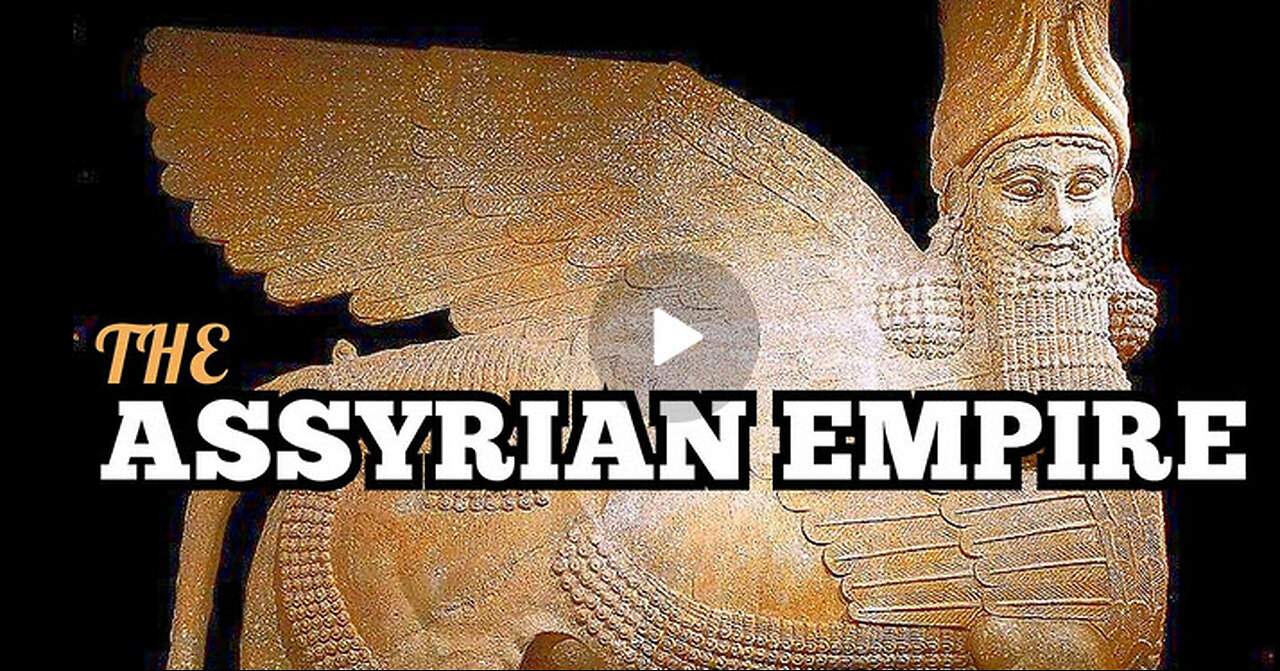Premium Only Content

The 'Assyrian' Empire of Iron" 'Fall of Civilizations' 'Assyria' Historical Documentary Series
History, Historical, The Assyrians, Assyrian Empire, Empires, Assyrians, The Empire of Iron, Assyria, Fall of Civilizations, Historical, Documentary, Docu Series, Assyria, Assyrian Empire, Cultures, Languages, Mankind, Human Race, Human History, Movie, Podcast, Podcasts, documentaries,
Assyrian Empire
Assyrian art, an introduction:
The Assyrian Empire during various phases of its history ...
January 2024, 1/19/2024, 1/19/24, 01/19/24, 01/19/2024, 1-19-2024, 01-19-24, 2024-01-19, 2024/01/19, Jan. 19th 2024, January 19th 2024, January 19, 2024.
King Sennacherib: The Warrior King of the Neo-Assyrian Empire
Assyrians | Age of Empires Series Wiki | Fandom
Assyria - World History Encyclopedia
Assyrian Empire: The Old Kingdom - History
The rise and fall of the Assyrian Empire - Marian H Feldman
What felled the great Assyrian Empire? A Yale professor ...
The Neo-Assyrian Empire (c. 921 - 627 BCE) (Illustration ...
Assyria was a major ancient Mesopotamian civilization which existed as a city-state from the 21st century BC to the 14th century BC, then to a territorial state, and eventually an empire from the 14th century BC to the 7th century BC.
In the lowlands of Northern Iraq, a series of enormous cities lies crumbling in ruins...
In this episode, find out about one of the most remarkable ancient civilizations: the society known today as the neo-Assyrian Empire. Discover how the Assyrians built their empire out of the ashes of the Bronze Age, and built an empire of iron that lasted for centuries. Explore the extraordinary flourishing of art and technology that they fostered. And finally, discover what happened to cause their final, devastating collapse.
Capital
Assur
(c. 2025–1233 BC)
Kar-Tukulti-Ninurta
(c. 1233–1207 BC)
Assur
(c. 1207–879 BC)
Nimrud
(879–706 BC)
Dur-Sharrukin
(706–705 BC)
Nineveh
(705–612 BC)
Harran
(612–609 BC)
Official languages
Akkadian
Sumerian
Aramaic
Religion
Ancient Mesopotamian religion
Government
Monarchy
Notable kings
• c. 2025 BC
Puzur-Ashur I (first)
• c. 1974–1935 BC
Erishum I
• c. 1808–1776 BC
Shamshi-Adad I
• c. 1700–1691 BC
Bel-bani
• c. 1363–1328 BC
Ashur-uballit I
• c. 1243–1207 BC
Tukulti-Ninurta I
• 1114–1076 BC
Tiglath-Pileser I
• 883–859 BC
Ashurnasirpal II
• 745–727 BC
Tiglath-Pileser III
• 705–681 BC
Sennacherib
• 681–669 BC
Esarhaddon
• 669–631 BC
Ashurbanipal
• 612–609 BC
Ashur-uballit II (last)
Historical era
Bronze Age to Iron Age
• Foundation of Assur
c. 2600 BC
• Assur becomes an independent city-state
c. 2025 BC[a]
• Old Assyrian period
c. 2025–1364 BC
• Middle Assyrian period
c. 1363–912 BC
• Neo-Assyrian period
911–609 BC
• Conquest by the Neo-Babylonian and Median empires
609 BC[b]
Preceded by Succeeded by
Third Dynasty of Ur
Neo-Babylonian Empire
Median Empire
Spanning from the early Bronze Age to the late Iron Age, modern historians typically divide ancient Assyrian history into the Early Assyrian (c. 2600–2025 BC), Old Assyrian (c. 2025–1364 BC), Middle Assyrian (c. 1363–912 BC), Neo-Assyrian (911–609 BC) and post-imperial (609 BC–c. AD 240) periods, based on political events and gradual changes in language. Assur, the first Assyrian capital, was founded c. 2600 BC but there is no evidence that the city was independent until the collapse of the Third Dynasty of Ur in the 21st century BC, when a line of independent kings beginning with Puzur-Ashur I began ruling the city. Centered in the Assyrian heartland in northern Mesopotamia, Assyrian power fluctuated over time. The city underwent several periods of foreign rule or domination before Assyria rose under Ashur-uballit I in the early 14th century BC as the Middle Assyrian Empire. In the Middle and Neo-Assyrian periods Assyria was one of the two major Mesopotamian kingdoms, alongside Babylonia in the south, and at times became the dominant power in the ancient Near East. Assyria was at its strongest in the Neo-Assyrian period, when the Assyrian army was the strongest military power in the world and the Assyrians ruled the largest empire then yet assembled in world history,spanning from parts of modern-day Iran in the east to Egypt in the west.
The Neo-Assyrian Empire fell in the late 7th century BC, conquered by a coalition of the Babylonians, who had lived under Assyrian rule for about a century, and the Medes.
If you enjoy Fall of Civilizations, consider supporting the show today:
/ fallofcivilizations_po...
CREDITS:
Sound engineering by Alexey Sibikin
Readings:
Hebrew - Rabbi Yaakov Wolbe
Ancient Greek - Pavlos Kapralos
Historical consultant - Dr. Ellie Bennett
Voice actors:
Mustafa Raee
Peter Walters
Lachlan Lucas
Carson Wishart
Nick Denton
Rhy Brignell
Annie Kelly
Lou Millington
-
 6:29
6:29
BIG NEM
18 hours agoCultivating God Mode: Ancient Taoist NoFap Practices
9.45K2 -
 30:53
30:53
Uncommon Sense In Current Times
1 day ago $0.52 earned"Pardon or Peril? How Biden’s Clemency Actions Could Backfire"
12.2K -
 40:01
40:01
CarlCrusher
16 hours agoSkinwalker Encounters in the Haunted Canyons of Magic Mesa - ep 4
11.3K2 -
 59:44
59:44
PMG
1 day ago $1.28 earned"BETRAYAL - Johnson's New Spending Bill EXPANDS COVID Plandemic Powers"
30.7K4 -
 6:48:50
6:48:50
Akademiks
14 hours agoKendrick Lamar and SZA disses Drake and BIG AK? HOLD UP! Diddy, Durk, JayZ update. Travis Hunter RUN
156K27 -
 11:45:14
11:45:14
Right Side Broadcasting Network
9 days agoLIVE REPLAY: TPUSA's America Fest Conference: Day Three - 12/21/24
340K28 -
 12:19
12:19
Tundra Tactical
14 hours ago $12.74 earnedDaniel Penny Beats Charges in NYC Subway Killing
62.8K12 -
 29:53
29:53
MYLUNCHBREAK CHANNEL PAGE
1 day agoUnder The Necropolis - Pt 1
153K52 -
 2:00:10
2:00:10
Bare Knuckle Fighting Championship
3 days agoCountdown to BKFC on DAZN HOLLYWOOD & FREE LIVE FIGHTS!
55.7K3 -
 2:53:01
2:53:01
Jewels Jones Live ®
1 day agoA MAGA-NIFICENT YEAR | A Political Rendezvous - Ep. 103
148K36